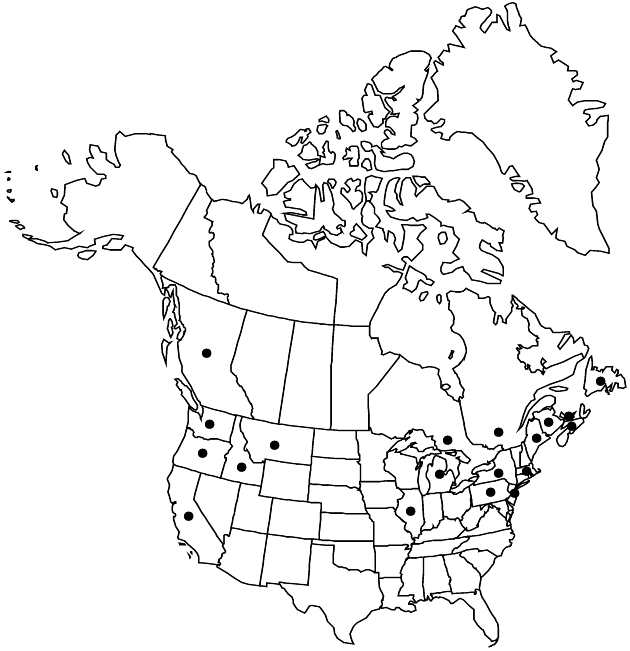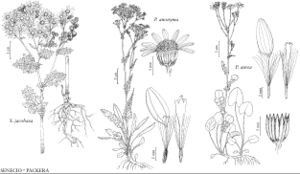Difference between revisions of "Senecio jacobaea"
Sp. Pl. 2: 870. 1753.
FNA>Volume Importer |
imported>Volume Importer |
||
| Line 8: | Line 8: | ||
}} | }} | ||
|common_names=Tansy ragwort;stinking Willie | |common_names=Tansy ragwort;stinking Willie | ||
| + | |special_status={{Treatment/ID/Special_status | ||
| + | |code=I | ||
| + | |label=Introduced | ||
| + | }}{{Treatment/ID/Special_status | ||
| + | |code=F | ||
| + | |label=Illustrated | ||
| + | }} | ||
|basionyms= | |basionyms= | ||
|synonyms={{Treatment/ID/Synonym | |synonyms={{Treatment/ID/Synonym | ||
| Line 28: | Line 35: | ||
|elevation=0–1500 m | |elevation=0–1500 m | ||
|distribution=St. Pierre and Miquelon;B.C.;N.B.;Nfld. and Labr. (Nfld.);N.S.;Ont.;P.E.I.;Que.;Calif.;Idaho;Ill.;Maine;Mass.;Mich.;Mont.;N.J.;N.Y.;Oreg.;Pa.;Wash.;Europe. | |distribution=St. Pierre and Miquelon;B.C.;N.B.;Nfld. and Labr. (Nfld.);N.S.;Ont.;P.E.I.;Que.;Calif.;Idaho;Ill.;Maine;Mass.;Mich.;Mont.;N.J.;N.Y.;Oreg.;Pa.;Wash.;Europe. | ||
| + | |introduced=true | ||
|discussion=<p><i>Senecio jacobaea</i> is a weed introduced from Europe and now well established in places of cool, damp summers. It is toxic to livestock and legally noxious in most states and provinces where it occurs.</p><!-- | |discussion=<p><i>Senecio jacobaea</i> is a weed introduced from Europe and now well established in places of cool, damp summers. It is toxic to livestock and legally noxious in most states and provinces where it occurs.</p><!-- | ||
--><p>The Russian botanist E. Wiebe (2000) resuscitated Jacobaea for plants that are treated here as <i>Senecio jacobaea</i>, <i>S. erucifolius</i>, and <i>S. cannabifolius</i>. Phylogenetic studies may confirm the utility of recognizing Jacobaea as a distinct genus; to do so here would be premature.</p> | --><p>The Russian botanist E. Wiebe (2000) resuscitated Jacobaea for plants that are treated here as <i>Senecio jacobaea</i>, <i>S. erucifolius</i>, and <i>S. cannabifolius</i>. Phylogenetic studies may confirm the utility of recognizing Jacobaea as a distinct genus; to do so here would be premature.</p> | ||
| Line 52: | Line 60: | ||
|publication title=Sp. Pl. | |publication title=Sp. Pl. | ||
|publication year=1753 | |publication year=1753 | ||
| − | |special status= | + | |special status=Introduced;Illustrated |
| − | |source xml=https:// | + | |source xml=https://bibilujan@bitbucket.org/aafc-mbb/fna-data-curation.git/src/bb6b7e3a7de7d3b7888a1ad48c7fd8f5c722d8d6/coarse_grained_fna_xml/V19-20-21/V20_1279.xml |
|tribe=Asteraceae tribe Senecioneae | |tribe=Asteraceae tribe Senecioneae | ||
|genus=Senecio | |genus=Senecio | ||
Revision as of 20:44, 27 May 2020
Perennials, 20–80(–100) cm (taprooted or branched caudices surmounting taproots). Herbage sparsely and unevenly tomentose, glabrescent except in leaf axils and among heads. Stems (often purplish-tinged) usually single, sometimes loosely clustered. Leaves ± evenly distributed (basal often withering before flowering); petiolate (sometimes obscurely); blades ovate to broadly ovate (usually 1–3-pinnate, lobes mostly obovate to spatulate), (4–)7–20(–30) × (1–)2–5(–12) cm, bases usually tapered, ultimate margins dentate (distal leaves similar, smaller). Heads (10–)20–60+ in corymbiform arrays. Calyculi of 2–6 (inconspicuous) bractlets (less than 2 mm). Phyllaries ± 13, 3–4(–5) mm, tips black or greenish. Ray florets ± 13; corolla laminae 8–12 mm. Cypselae all sparsely hairy or ray cypselae glabrous. 2n = 40.
Phenology: Flowering spring–early summer(–fall).
Habitat: Disturbed sites, pastures, roadsides, and waste grounds
Elevation: 0–1500 m
Distribution

Introduced; St. Pierre and Miquelon, B.C., N.B., Nfld. and Labr. (Nfld.), N.S., Ont., P.E.I., Que., Calif., Idaho, Ill., Maine, Mass., Mich., Mont., N.J., N.Y., Oreg., Pa., Wash., Europe.
Discussion
Senecio jacobaea is a weed introduced from Europe and now well established in places of cool, damp summers. It is toxic to livestock and legally noxious in most states and provinces where it occurs.
The Russian botanist E. Wiebe (2000) resuscitated Jacobaea for plants that are treated here as Senecio jacobaea, S. erucifolius, and S. cannabifolius. Phylogenetic studies may confirm the utility of recognizing Jacobaea as a distinct genus; to do so here would be premature.
Selected References
None.
